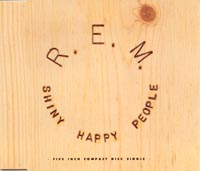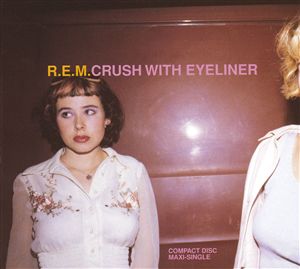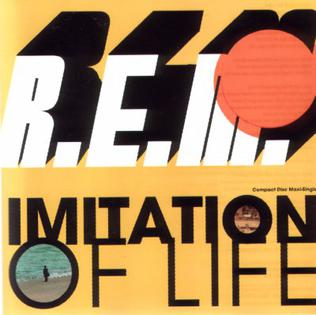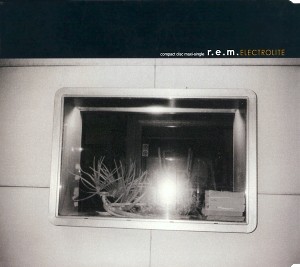Related Research Articles

Fairleigh Dickinson University is a private university with its main campuses in New Jersey, located in Madison / Florham Park and in Teaneck / Hackensack. Founded in 1942, Fairleigh Dickinson University offers more than 100 degree programs. In addition to two campuses in New Jersey, the university has a campus in Vancouver, British Columbia, one in Wroxton, Oxfordshire, United Kingdom, and an online platform. Fairleigh Dickinson University is New Jersey's largest private institution of higher education, with over 12,000 students.

"Losing My Religion" is a song by American alternative rock band R.E.M., released in February 1991 by Warner Bros. as the first single and the second track from the group's seventh album, Out of Time (1991). Built on a mandolin riff, it was written by lead singer Michael Stipe and is about unrequited love. The song was an unlikely hit for the group, garnering extensive airplay on radio as well as on MTV and VH1 due to its critically acclaimed music video, directed by Tarsem Singh. The single became R.E.M.'s highest-charting hit in the United States, reaching No. 4 on the Billboard Hot 100 and expanding the group's popularity beyond its original fan-base. At the 1992 Grammy Awards, "Losing My Religion" won two awards: Best Short Form Music Video and Best Pop Performance by a Duo or Group with Vocal. In 2017, "Losing My Religion" was inducted into the Grammy Hall of Fame.

"What's the Frequency, Kenneth?" is a song by American alternative rock band R.E.M. from their ninth studio album, Monster (1994). The song's title refers to an incident in New York City in 1986 in which two then-unknown assailants attacked journalist Dan Rather while repeating "Kenneth, what is the frequency?"

Michael Edward Mills is an American multi-instrumentalist, singer, and composer who was a founding member of the alternative rock band R.E.M. Though known primarily as the bass guitarist and backing vocalist of R.E.M., his musical repertoire also includes keyboards, guitar and occasional lead vocals. He contributed to a majority of the band's musical compositions and is the only member to have had formal musical training.

"Nightswimming" is a song by American alternative rock band R.E.M., released in July 1993 by Warner Bros. as the fifth single from the band's eighth album, Automatic for the People (1992). The song is a ballad featuring singer Michael Stipe accompanied only by bassist Mike Mills on piano, a string arrangement by former Led Zeppelin bassist John Paul Jones, and a prominent oboe by Deborah Workman in the latter part of the piece. Stipe sings about a group of friends who go skinny dipping at night, which draws from similar experiences in the band's early days. The music video for the song was directed by Jem Cohen.

"Shiny Happy People" is a song by the American rock band R.E.M., released as the second single from their seventh studio album, Out of Time (1991). It features guest vocals by Kate Pierson of the B-52's, who also appears in the music video.

"Everybody Hurts" is a song by American rock band R.E.M. from their eighth studio album, Automatic for the People (1992), and released as a single in April 1993 by Warner Bros. Records. It peaked at number 29 on the US Billboard Hot 100, but fared much better on the US Cash Box Top 100, where it peaked at number 18. The song also reached the top 10 on the charts of Australia, Canada, France, Iceland, Ireland, the Netherlands, and the United Kingdom. Its music video was directed by Jake Scott and filmed in San Antonio, Texas. In 2003, Q ranked "Everybody Hurts" at number 31 on their list of the "1001 Best Songs Ever", and in 2005, Blender ranked the song at number 238 on their list of "Greatest Songs Since You Were Born".

"Man on the Moon" is a song by American alternative rock band R.E.M., released in November 1992 as the second single from their eighth album, Automatic for the People (1992). The lyrics were written by lead singer Michael Stipe, and the music by drummer Bill Berry and guitarist Peter Buck. The song was well received by critics and reached number 30 on the US Billboard Hot 100, number 17 on the US Cash Box Top 100, number 18 on the UK Singles Chart, and number one in Iceland. It remains one of R.E.M.'s most popular songs and was included on the compilations In Time: The Best of R.E.M. 1988–2003 and Part Lies, Part Heart, Part Truth, Part Garbage 1982–2011.

"Crush with Eyeliner" is a song by American rock band R.E.M., released by Warner Bros. Records as the third single from their ninth studio album, Monster (1994). Sonic Youth's Thurston Moore provides background vocals. Michael Stipe claims the song was inspired by the band New York Dolls, who, in his opinion, "knew how to exaggerate a song, to make it sound really sleazy and over the top." This was also one of the first songs that surfaced from Stipe after the writer's block that hounded him after the death of his friend, actor River Phoenix.

"Tongue" is a song by American rock band R.E.M., released on July 17, 1995 by Warner Bros. Records, as the fifth and final single from their ninth studio album, Monster (1994). The song was only released in the US, UK, and Ireland. In the song, lead singer Michael Stipe performs in falsetto; he has stated on several occasions that the narrator of the song is female. Stipe has also said the track is "all about cunnilingus".

"The Sidewinder Sleeps Tonite" is a song by American alternative rock band R.E.M. It was influenced by the song "The Lion Sleeps Tonight", both in the title of the song and through the song's opening refrain. The band used "The Lion Sleeps Tonight" as the B-side to this song in the U.S. The song was released on R.E.M.'s 1992 album, Automatic for the People, and was later released as a single in February 1993, reaching number one in Iceland, number 13 in Ireland, number 17 in the United Kingdom, and number 29 in New Zealand. Its music video was directed by Kevin Kerslake.

William Joseph Raftery is an American basketball analyst and former college basketball coach.

"Imitation of Life" is a song by American alternative rock band R.E.M. It was written by band members Peter Buck, Mike Mills, and Michael Stipe and produced by the band with Pat McCarthy for their 12th studio album, Reveal (2001). The track's title comes from Douglas Sirk's 1959 film of the same name and is used as a metaphor for adolescence and adulthood. One of R.E.M.'s most pop-influenced tracks, "Imitation of Life" has been described lyrically as "see[ing] through the puffed-up performance of a hopeful entertainer", as well as the enjoyment of love.

"Electrolite" is a song by American rock band R.E.M., released as their third single and closing track from their tenth studio album, New Adventures in Hi-Fi (1996). The song is a piano-based ballad to Los Angeles, Hollywood icons and the closing 20th century. Initially, Michael Stipe objected to including the song on the album, but was won over by Peter Buck and Mike Mills. It has since become one of his favorite R.E.M. songs as well as one of Radiohead lead singer Thom Yorke's; Radiohead has covered the song.

Athens, GA: Inside/Out is a 1986 documentary film about the mid-1980s music scene in Athens, Georgia. The film has been described as "the definitive portrait of the city's world-renowned music scene."

"So. Central Rain " is a song by the American alternative rock band R.E.M. It was released in May 1984 as the first single from the group's second studio album, Reckoning.

"Find the River" is a song by American rock band R.E.M., released on November 29, 1993, by Warner Bros., as the sixth and final single from the band's eighth album, Automatic for the People (1992). The song reached number 54 on the UK Singles Charts in December 1993. It did not chart in the US. "Find the River" was one of only three R.E.M. singles released in the 1990s to not make the Top 40 in Britain. The song's music video was directed by Jodi Wille.

"Drive" is a song by American alternative rock band R.E.M. It is the first track on and the lead single from their eighth studio album, Automatic for the People (1992), and was the first song lead singer Michael Stipe wrote on a computer. "Drive" peaked at number 28 on the US Billboard Hot 100, number one on the Billboard Modern Rock Tracks chart, and number two on the Billboard Album Rock Tracks chart. Internationally, "Drive" became R.E.M.'s then-second-biggest hit on the UK Singles Charts, peaking at number 11, and their biggest hit in Norway until "Supernatural Superserious" in 2008, reaching number three. Elsewhere, the song reached the top 10 in Canada, Ireland, New Zealand, and Switzerland.

"All the Way to Reno (You're Gonna Be a Star)" is a song by American rock band R.E.M. It was released on July 23, 2001 as the second single from the band's twelfth studio album, Reveal (2001). The single did not chart on the US Billboard Hot 100, but it did reach number 24 on the UK Singles Chart, number 31 in Italy, and number 34 in Ireland.
Paul Zimmer is an American poet, and editor.
References
- ↑ "FDUFilm Faculty and Guest Speakers". Fairleigh Dickinson University. Retrieved 2024-06-10.
- 1 2 3 "Howard Libov". Fairleigh Dickinson University. Retrieved 2024-06-10.
- ↑ When the Light Is Mine: The Best of the I.R.S. Years 1982–1987 (liner notes). R.E.M. Capitol Records. 2006. 09463-69945-9-8.
{{cite AV media notes}}: CS1 maint: others in cite AV media (notes) (link) - ↑ Pilley, Max (2023-03-23). R.E.M. Album by Album. White Owl. ISBN 978-1-3990-1763-3.
- ↑ Hale, Grace Elizabeth (2020-02-13). Cool Town: How Athens, Georgia, Launched Alternative Music and Changed American Culture. UNC Press Books. p. 157. ISBN 978-1-4696-5488-1.
- ↑ "MIKE MILLS SONG FEATURED IN NEW MOVIE | R.E.M.HQ". 2009-02-19. Retrieved 2024-06-10.
- ↑ Gill, Andy (5 March 1991). "The Home Guard". Q Magazine. 55: 56–61.
- ↑ Staff, New York Times; NY, Times (1996). The New York Times Film Reviews, 1993-1994. Garland Publishing, Incorporated. p. 473. ISBN 978-0-8240-7593-4.